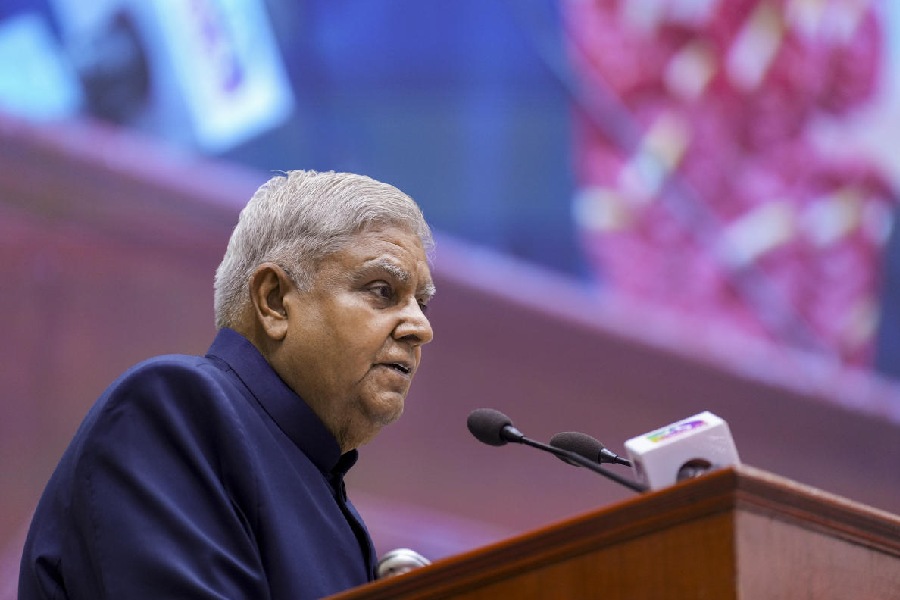Opposition parties aligned with the INDIA bloc have submitted a notice seeking the scalp of Rajya Sabha Chairman Jagdeep Dhankhar, marking the first-ever attempt to remove a presiding officer of the Upper House in its 72-year existence.
The Opposition has accused Dhankhar of running the House in a partisan manner. The notice was submitted on Tuesday under Article 67 of the Constitution, which relates to the removal of the Vice-President, who is also the Chairman of the Rajya Sabha.
Article 67(b) says: “A Vice-President may be removed from his office by a resolution of the council of states passed by a majority of all the then members of the council and agreed to by the House of the People; but no resolution for the purpose of this clause shall be moved unless at least 14 days’ notice has been given of the intention to move the resolution.”
A serving and a retired official expressed doubt if the notice can be admitted since constitutional provisions stipulate a 14-day cooling-off period. Since the winter session will end on December 20, only 10 days from Tuesday, there is no clarity if the notice can stand scrutiny.
After the notice is admitted, a resolution has to be passed in the Rajya Sabha and then in the Lok Sabha. The INDIA bloc has 86 members in the 231-member Upper House. The BJP-led NDA has 114 members. There are six nominated members who are usually with the government. Some parties like the BJD, YSR Congress, BRS and the BSP are part of neither the NDA nor INDIA.
“If at all the notice is admitted and a resolution brought, it is unlikely to be passed in the House. The action by the Opposition parties is aimed more at registering disapproval about the functioning of the Rajya Sabha,” a former official said.
The Congress leader in the Rajya Sabha, Jairam Ramesh, wrote on X: “All parties belonging to the INDIA group have no option but to formally submit a no-confidence motion against the learned Hon’ble Chairman of the Rajya Sabha for the extremely partisan manner in which he has been conducting the proceedings of the council of states.... The motion has just been submitted to the secretary-general of the Rajya Sabha.”
In another post, Ramesh wrote that the Opposition had thrice in the past moved such motions against Deputy Speakers of the Lok Sabha.
In December 1954, a motion was moved against then Deputy Speaker A. Ayyangar. It did not pass in the House. In November 1966, a motion was moved against S.V. Krishnamoorthy Rao but the required number of 50 members did not stand up to support the motion, leading to its rejection. In April 1987, a motion was moved against Thambi Durai but it, too, could not be passed.
A source said Tuesday’s notice refers to several speeches and observations by Dhankhar and the conduct of the House on Monday, when he allowed several BJP MPs to speak after rejecting the party’s motion to discuss an alleged Congress plot to “destabilise” India. The source said the notice quoted an observation by Dhankharpraising the RSS.
Since the beginning of the winter session, the Opposition has been demanding discussions under Rule 267 on the US bribery accusations against the Adani group, the violence in Sambhal and Manipur, and the law-and-order situation in Delhi. The Chairman has rejected them all.
Rule 267 allows members to seek the suspension of listed business to discuss urgent matters.
The BJP had on Monday moved a notice for a discussion on “links between the Congress and foreign agencies” in efforts to destabilise India. After rejecting the notice formally, Dhankhar allowed a dozen BJP members to speak on the subject since they were protesting.
BJP president J.P. Nadda was allowed to speak for about five minutes while leader of the Opposition Mallikarjun Kharge complained that he was not given adequate opportunity. Congress members Rajiv Shukla and Digvijaya Singh questioned the Chairman’s conduct and asked him under which rule he had allowed the BJP members to speak on a matter he had rejected for discussion.
Parliamentary affairs minister Kiren Rijiju on Tuesday underlined that the NDA had a majority in the Upper House and said the Opposition’s notice “must be rejected and will be rejected”.
“In the Rajya Sabha, Congress and around 60 other members raised a notice against the Vice-President. The chair’s authority must be respected. We respect Jagdeep Dhankharji a lot. The notice against the Vice-President by the 60 MPs is condemnable,” Rijiju told reporters.











